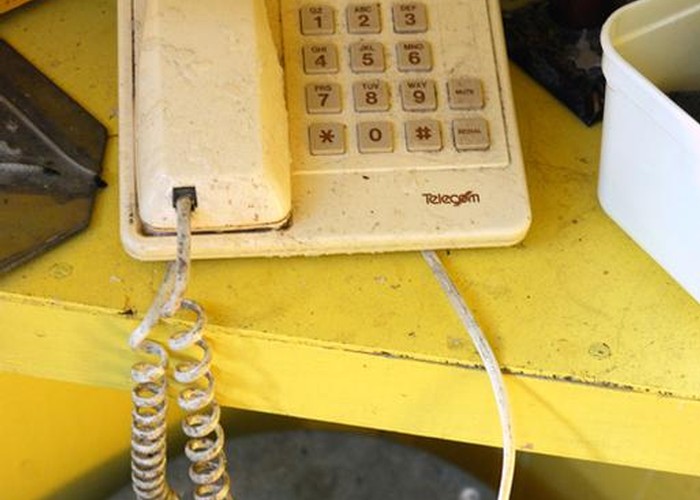"Steve Azula"
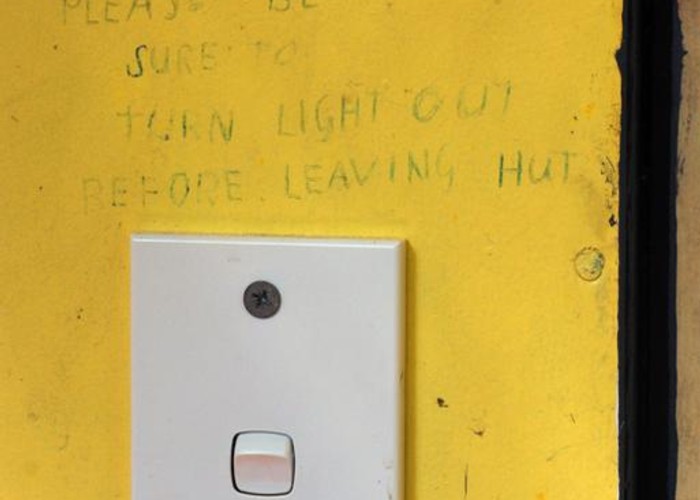
bspiers@gmail.com
The morning brought light in through the plastic skylights and warmed the interior. It also gave us our first good look at the objects that were given to this hut. As mentioned, it has no power, not even an inside fire or a water tank. Yet, somehow there is installed in the ceiling a 75 watt light bulb in a bracket and with a light shade, the switch to it is on the wall[1]. I ran my fingers over the phone, amazing. This hut was suddenly full of objects of relinquished value. Looking all over, his eyes darting Bataille utters: “To sacrifice is not to kill but to relinquish and to give”[2]. The light and the light switch were clearly the giving up of electricity, similarly with the phone, although there is no phone line so this is the relinquishment of communication[3] itself (which if we are familiar with Hegel we will notice that it defines a relation on the sacred) – given up of course because they are of value[4]. It is interesting that once there was a vacuum cleaner that someone had hauled over those tops to this hut, but that was removed in a modern day version of cultural suppression; DoC[5] had flown in a helicopter and removed all the ‘junk’. At just that moment Adolf Loos popped his head in to mention “cultural evolution is equivalent to the removal of ornament from articles in daily use”[6], and just as quickly he took off, plenty of hours in the day still – would not want to waste them. While the hut had been cleaned out of its objects, it filled back up again slowly through the various visits. This hut offers an example of a place where the things given up, the telephone and the lights/switch are given up in a way that draws a clear meaning: in the context the telephone is useless as a telephone, and even in the city its value was probably only $20, but it was carried out there so that it would be ripped out of context and once in the hut would no longer be just a telephone – it was ‘the’ telephone – it was fully returned to its intimate value. The telephone etc were a type of ‘necessary ornamentation’ and thus part of the articles in daily use, so in a way should therefore be left to remain.
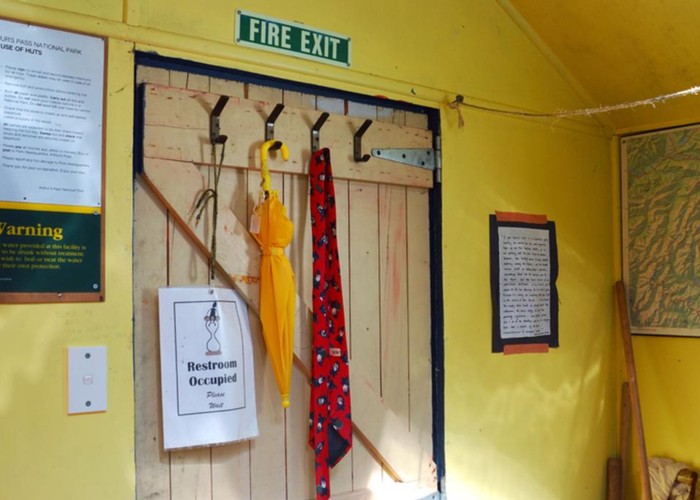


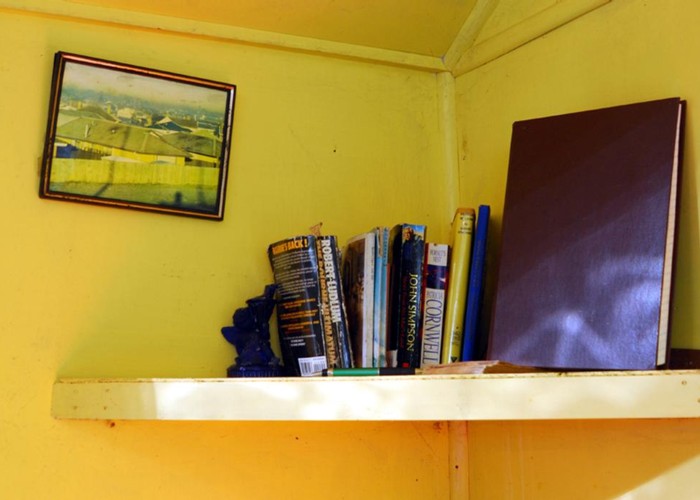
To tell you the truth, sitting in the hut and looking around seeing the lights and telephone and then needing to walk down to the river for water and then boiling it slowly over a cooker makes the place discombobulating. The place is quite nostalgically timeless/kitsch, it has old curtains and a 1970’s first aid kit, and a Santa neck-tie hung on the back of the door (to signal consummation? if hung outside on the door/but it is INSIDE which must mean the consummation is occurring outside?). Above the bookshelf there is a picture of the suburbs in a picture frame. Houses as far as the eye can see. In the city we put nature in the frame and out here it is the city itself that takes on a new nostalgic/romanticist glaze – oh a hot shower! I was thinking that someone should carry in a child’s bike (a tricycle I reckon) and set it in the corner, so that as you arrive you get the full force of the nostalgic childhood ‘yellowified’ gaze. A similar thing happens with the tools in the corner, they have an air of communistic propaganda about them. Even the LIGHT bulb appears to be haloed just as in Christian art. But still the interior is yellow and along with those skylights it was very ‘warm’ to look at in its hyper-reality. For all the effort taken to get here it is quite remarkable how few hours are actually spent at the hut. Most people seem to, by reading the hut book, end up arriving at 8pm or something and leave again at 8.30am to make it to the car in one day. It was lunch time and we were heading back up on to the tops to camp.
[1] Above the switch is written: please be sure to turn out the lights before leaving. Grimshaw has mentioned that this is perhaps a statement claiming that we should ‘not waste’ what is valuable (electricity – the ‘spark’ that we all share?).
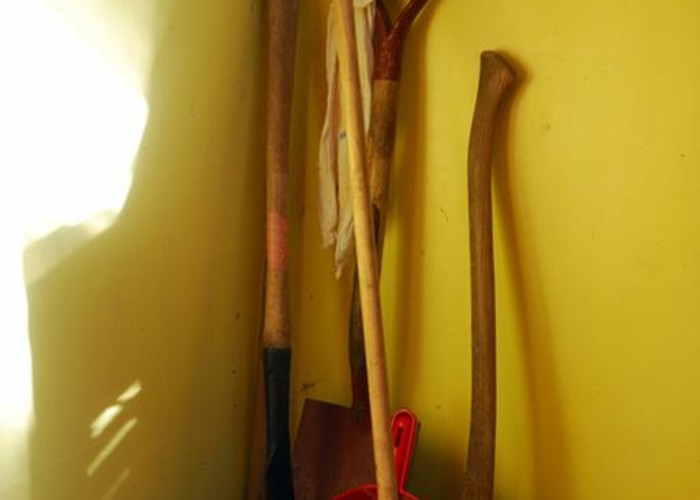
[2] Bataille, 1989, 48-49
[3] In Hobbes State of Nature there would be no letters or postal services…because everyone exists in an environment of mutual suspicion. Perhaps this is a dig at Hobbes. We had no communication, but we also had no weapons…my mum once said to me ‘but what if someone tries to get you’ etc I just looked at her kind of weird….This was no state of nature, if anything it would be the re-creation of nature in the state, which is exactly what Hobbes, Locke and Rousseau did through their enquiries….re-create an idea of nature from within the state. Much like Peter Pan and ‘Neverland’, it never was…and exists only as a result of/for intellectual enquiry. The Hegelian insight is Nancy’s.
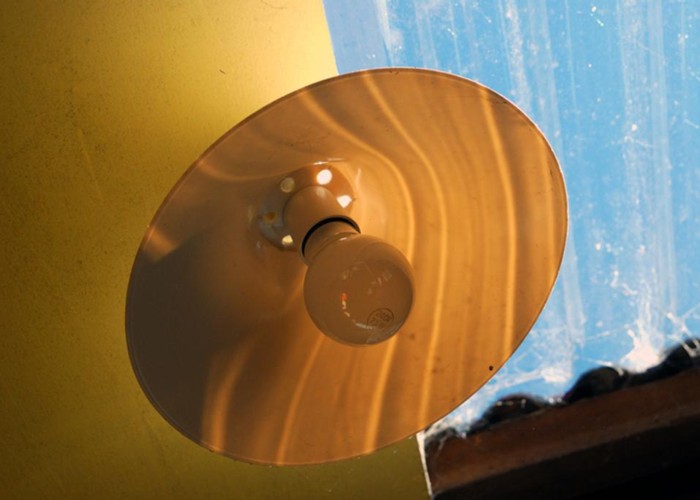
[4] For example, having no electricity makes it really hard to read, candles are not bright enough…you realise the value suddenly when the switch does not work.
[5] Perhaps they were radical feminists? When faced with a road-side shrine the Loosian modern would, in contrast to the radical who would berate the shrine-goers, ‘doff’ his hat respecting what it represented (or attempted to represent) while himself being beyond needing it… See Grimshaw, M (2005) “Notes toward a Loos-ian theory of religion in modernity”, Method and Theory in the Study of Religion, pp382-392.
[6] Loos, 1966, 226-227

